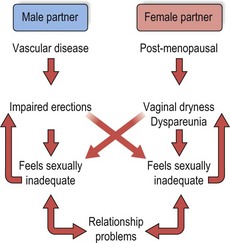Psychosexual disorders
Psychosexual disorders fall into three main groups in ICD10: sexual dysfunction, gender identity disorders and disorders of sexual preference (Table 1). Sexual dysfunction is the most common of these groups, and so will be discussed in detail.
Table 1 ICD10 classification of sexual disorders
Sexual dysfunction, not caused by organic disorder or disease
The title of this category in ICD10 is misleading. It implies that sexual dysfunction is caused either by organic illness and disease or by psychological factors when, in fact, it is often caused by a combination of the two. An example of this is given in Figure 1 which also demonstrates how sexual dysfunction is often the result of problems in both partners.
< div class='tao-gold-member'>
Only gold members can continue reading. Log In or Register to continue
Stay updated, free articles. Join our Telegram channel

Full access? Get Clinical Tree




